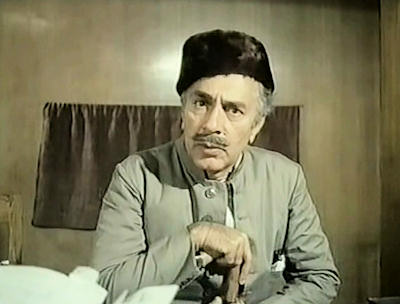Forty one years after its theatrical release, Garm Hava, M S Sathyu’s seminal work on a country suffering the aftershocks of Partition will grace cinema screens again on November 14.PVR group’s limited release arm, Director’s Rare, will release the movie (digitally restored by Indikino Edutainment) in Mumbai, Delhi, Bengaluru, Chennai, Pune and Ahmedabad. Those who have caught the film in cinemas in 1973 or on television, will remember among other dramatic scenes, the opening credits where even before a single scene has unfolded, you are shaken by the montage of scenes of celebration in independent India and then unsparing images of burnt homes, weapons of mass murder, trains loaded with the displaced. And then appear on the screen, names like Kaifi Azmi, Shama Zaidi and Ismat Chughtai.
**
Three literary voices that brought this story of intense loss and living tragedy alive for generations of viewers. Garm Hava went on to win a National Award and was India’s entry for the Academy Awards in the Best Foreign Film category. The film based on a short story by Chughtai is still as relevant today as it was then. M S Sathyu, the maker of the classic, certainly thinks so and says, “Well, this was the first film on the Partition of Punjab. It was made almost 25 years after the event. Before then the Partition in Bengal was the subject of Nemai Ghosh’s Chinnamul and a couple of films of Ritwik Ghatak dealt with the Partition of Bengal as well. Today when secular parties and the Left have failed to govern this country and now fundamentalists and communal parties have taken over, perhaps this is the right time to bring back the film. Hope it succeeds.”
**
A remake of the film would have been impossible now given the stature of the writers who gave it its core. Sathyu says, “There is no need to remake Garm Hava now. Restoring and releasing it in theatres all over the country is relevant.” How did the film originate? Sathyu reminisces, “B K Karanjia, Chairman of the Film Finance Corporation (FFC), liked the subject and sanctioned a loan.” Though the idea was ignited by an Ismat Chughtai story, it was Shama Zaidi, says Sathyu, who wrote the first script. The script was then shared and discussed with Chughtai and also Rajendra Singh Bedi (an Urdu writer of the Progressive Writers’ Movement who later made films like Dastak and Phagun). Sathyu adds, “Inputs from these two helped in arriving at the film’s final script.” Funding the film was an uphill task (it cost just over Rs 8 lakh) and Sathyu recalls, “A lot of my friends contributed money because the FFC fund was hardly enough.”
**
The dialogues had great pathos and Kaifi Azmi invested a lot of his personal passion for the ideals of humanism and integrated nationhood in his writing. He also penned the stirring qawwali sung by Aziz Ahmed Khan Warsi in the film. The ensemble cast was stellar too. Starting with Balraj Sahni, A K Hangal, debutant Farooq Shaikh, Geeta Siddharth and Jalal Agha.
**
Sathyu recalls, “Artistes from the Indian People’s Theatre Association (IPTA) from Bombay, Agra and Delhi took very little money and were cast in the film with the exception of Jalal Agha and Jamal Hashmi. Farooq and Balrajji were also known to us through theatre. Finding an actress to play the old mother was the most difficult task. We found Badar Begum, a non-actress, in Agra. She was running a brothel then.” Among other challenges the unit faced, was the shoot in Agra which was fraught with difficulties. Filmlore has it that due to repeated protests against the shoot, a ‘fake’ second unit with unloaded cameras was sent to various locations so that the film’s actual locations could be protected.
**
Sathyu adds, “The film released despite many problems…getting the censor certificate took us almost a year.” Sathyu’s daughter Seema is looking forward to the release and says, “I feel a sense of great pride to be a part of this legacy. Garm Hava is a classic in every sense of the word. In many ways it has shaped me as a person. In today’s context, when you watch the film, it only shows how perfectly the pulse of our young nation was captured and how things, now, are still unchanged. I was just eight during the shoot in Agra and imbibed so much. I used to hold the director’s jhola and gave the clap a few times too! I cry every time I see the film. It is not dated at all and remains timelessly relevant.”
**
Garm Hava in a nutshell
Garm Hava is the story of the Mirza family at the time of the Partition in 1947. While one of the brothers Halim Mirza (Dinanath Zutshi) decides to go to Pakistan, Salim (Balraj Sahni) stays back in India but has to face the failure of his ancestral business when his factory is burnt. He also suffers one personal loss after another. The real loss is of course that of identity, a sense of home and innocence.







 with
with